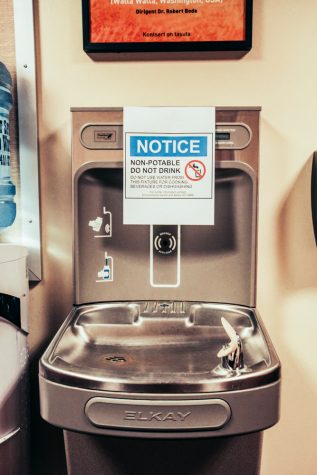Lead Exposure
Whitman College solves lead-contaminated water issues
September 8, 2016

Not many would think that at Whitman College, an institution where students have access to myriad resources and a breathtaking campus, students, faculty and staff may have been exposed to dangerous levels of lead. On August 19, a notice was sent to the Whitman College community with information that multiple locations on campus tested positive for excessive lead in drinking water. Through the end of August and the beginning of September, college officials replaced faucets and other hardware to solve the problem.
Following a request from a Whitman parent, this summer the college worked with Blue Mountain Environmental Consulting to test on-campus drinking water for lead for the first time in Whitman’s history. Whitman has worked with BMEC in the past to test and remove asbestos on campus.
This year, the general public is more familiar with lead exposure from news like the Flint water crisis. Peter Harvey, Chief Financial Officer of Whitman College, supervised the lead testing process. According to Harvey, there is now public awareness that lead can be found in buildings and pipelines. “With parents asking us questions, we thought that we should check it out,” Harvey said.
Forty-nine campus locations were tested and BMEC found that three locations had excessive levels of lead. The Welty Student Health Center and two drinking fountains in the Hall of Music exceeded the U.S. Environmental Protection Agency’s (EPA’s) safe lead limits.
Because the water has never been tested in the past, it is unknown how long the Whitman community may have been exposed to lead.
In 1984, the U.S. Congress passed the Safe Drinking Water Act, a law that requires the EPA to set standards for safe drinking water. The current EPA safe level for lead is 15 parts per billion (ppb). The Health Center’s water measured 24 ppb and the two drinking fountains in the Hall of Music clocked in at 16 ppb and 18 ppb. According to the Centers for Disease Control, the effects of lead exposure on adults ranges from increased influenza and cold cases to severe, permanent neurological disorders.
After learning the physiological effects of lead, many students commented that it is ironic that the Health Center had the highest levels of lead.
“It’s surprising that there is lead in the Health Center’s water,” said sophomore Isiah Cocroft. “You go there to get healthy and you don’t want to end up with lead poisoning.”
In the past, Whitman College has relied on water testing from the City of Walla Walla. Because of this, Whitman College had never tested its own water specifically before this summer. It is possible that students and faculty may have been drinking water with lead in it for months or even years.
Senior music major Peter Ramaley frequents the drinking fountains in the music building but was not particularly concerned with his exposure. “Frankly, it doesn’t bother me that much. What I do worry about is the faculty who have been drinking out of those fountains for twenty-some years,” Ramaley said.

Fortunately, both Harvey and Fred Miller, Whitman’s Environmental Health and Safety Manager, believe that they have found the source of the lead and they will be able to remove it this week.
“We developed a theory that the lead was related to the water meter that was provided to us by the city,” Harvey said. Indeed, the water in the music building was contaminated by the city’s water meter. After Whitman notified the City of Walla Walla, the meter was replaced the next day. The water in the music building is now safe to drink.
The Health Center’s water appears to have been contaminated by corroding faucets and other fixtures. They have fixed the problem by replacing corroded faucets. The Health Center’s water is now also safe to drink. Harvey appreciates the community support that they have had throughout this process.
“One parent who is a plumber offered to help if we needed to replace fixtures, which was really nice,” Harvey said.
How will Whitman prevent this from happening again in the future? Both Harvey noted that they will create plans to check water quality regularly but that the most recent lead issue is currently the main priority.
“We are trying to deal with the immediate issues first. I think we need to really study what the city’s water testings are and get some advice on that,” Harvey said.
In general, Whitman College community members have been grateful for the College’s transparency with this process. A few parents and faculty members emailed Miller questions about the process, but Miller and Harvey have not received any negative feedback.
“I just think it’s good that they are doing something about the lead,” commented sophomore Ye Rim Cho.





